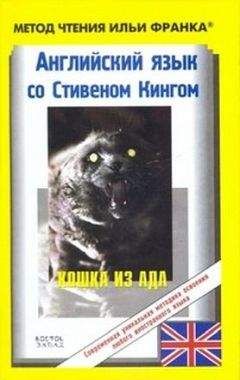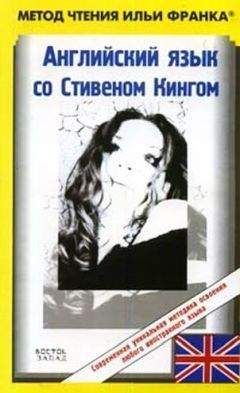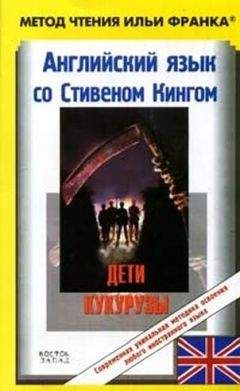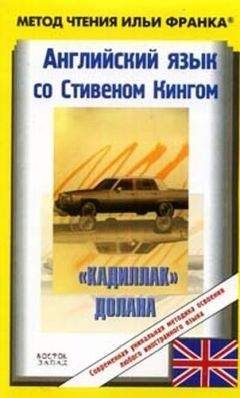Stephen King - Английский язык с С. Кингом "Верхом на пуле"
“Nothing like a funeral (нет ничего лучше похорон),” he said, and laughed (сказал он и засмеялся). “Isn't that what you said (так ты сказал)? You slipped there, Al (ты поскользнулся на этом, Ал/ан/; to slip — скользить; поскользнуться; совершатьпромах, оплошность). No doubt about it (в этом нет сомнения). Slipped (поскользнулся), tripped (споткнулся), and fell (и упал).”
“Let me out (выпусти меня),” I whispered (прошептал я). “Please (пожалуйста).”
“Well,” he said, turning toward me (поворачиваясь ко мне), “we have to talk about that, don't we (нам надо поговорить об этом, не так ли)? Do you know who I am, Alan (ты знаешь, кто я, Алан)?”
“You're a ghost (ты призрак),” I said.
He gave an impatient little snort (он нетерпеливо фыркнул: «издал нетерпеливое маленькое фырканье»), and in the glow of the speedometer the corners of his mouth turned down (и в свете спидометра /я увидел, как/ уголки его рта опустились вниз). “Come on, man, you can do better than that (давай же, приятель, ты можешь сделать лучше = ты способен на большее). Fuckin Casper's a ghost (чертов Каспер — /это/ призрак). Do I float in the air (/разве/ я летаю по воздуху)? Can you see through me (/разве/ ты видишь сквозь меня)?” He held up one of his hands (он выставил одну руку), opened and closed it in front of me (открыл и закрыл ее передо мной). I could hear the dry, unlubricated sound of his tendons creaking (я услышал сухой звук его скрипящих сухожилий, как будто они не смазаны;to lubricate — делатьгладким; смазывать).
impatient [Im'peIS(q)nt], lubricate ['lHbrIkeIt], tendon ['tendqn]
“Nothing like a funeral,” he said, and laughed. “Isn't that what you said? You slipped there, Al. No doubt about it. Slipped, tripped, and fell.”
“Let me out,” I whispered. “Please.”
“Well,” he said, turning toward me, “we have to talk about that, don't we? Do you know who I am, Alan?”
“You're a ghost,” I said. He gave an impatient little snort, and in the glow of the speedometer the corners of his mouth turned down. “Come on, man, you can do better than that. Fuckin Casper's a ghost. Do I float in the air? Can you see through me?” He held up one of his hands, opened and closed it in front of me. I could hear the dry, unlubricated sound of his tendons creaking.
I tried to say something (я пытался что-то сказать). I don't know what (я не знал, что), and it doesn't really matter (и в общем-то это не имело значения), because nothing came out (потому что ничего не выходило).
“I'm a kind of messenger (я своего рода посланец),” Staub said. “Fuckin FedEx from beyond the grave, you like that (чертов курьер из загробного мира: «из-за могилы», как тебе это нравится; FedEx — /отFederal Express/ компания, занимающаясякурьерскойдоставкой)? Guys like me actually come out pretty often (парни вроде меня на самом деле выходят довольно часто; pretty — миловидный, приятный; /нареч./ довольно, достаточно) whenever the circumstances are just right (всякий раз, когда обстоятельства подходящие). You know what I think (ты знаешь, что я думаю)? I think that whoever runs things — God or whatever — must like to be entertained (я думаю, что кто бы ни управлял миром: «вещами», Бог или кто-то другой, ему, должно быть, нравится развлекаться: «быть развлеченным»; to run — бегать; управлять). He always wants to see if you'll keep what you already got (он всегда хочет посмотреть/выяснить, будешь ли ты держаться за то, что у тебя уже есть) or if he can talk you into goin for what's behind the curtain (или он сможет уговорить тебя предпочесть то, что /скрыто/ за занавесом; to talk into… — уговорить, убедить /сделать что-либо/; to go for smth. — сходить за чем-либо; стремиться получить что-либо; выбрать, предпочесть что-либо). Things have to be just right, though (однако, обстоятельства: «вещи» должны быть подходящими). Tonight they were (сегодня ночью они были). You out all by yourself (ты на улице совсем один; out — вне, снаружи)... mother sick (мать больна)... needin a ride (нужна попутка)...”
circumstance ['sWkqmstqns], entertain ["entq'teIn], curtain ['kWtn]
I tried to say something. I don't know what, and it doesn't really matter, because nothing came out.
“I'm a kind of messenger,” Staub said. “Fuckin FedEx from beyond the grave, you like that? Guys like me actually come out pretty often whenever the circumstances are just right. You know what I think? I think that whoever runs things — God or whatever — must like to be entertained. He always wants to see if you'll keep what you already got or if he can talk you into goin for what's behind the curtain. Things have to be just right, though. Tonight they were. You out all by yourself... mother sick... needin a ride...”
“If I'd stayed with the old man (если бы я остался со стариком), none of this would have happened (ничего этого не случилось бы),” I said. “Would it (ведь так)?” I could smell Staub clearly now (теперь я ясно чувствовал запах Стауба), the needle-sharp smell of the chemicals and the duller, blunter stink of decaying meat (острый, как игла, запах химикатов и более смутную, притупленную вонь разлагающегося/гниющего мяса; dull — глупый; приглушенный; ; неясный, смутный; слабый), and wondered how I ever could have missed it (и задумался, как я мог упустить его = этот запах), or mistaken it for something else (или принять за что-то другое).
“Hard to say (трудно сказать),” Staub replied (ответил). “Maybe this old man you're talking about was dead, too (может быть этот старик, о котором ты говоришь, тоже был мертвым).”
I thought of old man's shrill handful-of-glass voice (я подумал о пронзительном, наполненным стеклом голосе старика; handful — пригоршня, горсть), the snap of his truss (о треске его бандажа). No, he hadn't been dead (нет, он не был мертвым), and I had traded the smell of piss in his old Dodge for something a lot worse (и я обменял запах мочи в его старом “додже” на что-то намного худшее;to trade — торговать; обменивать).
needle ['nJdl], decay [dI'keI], reply [rI'plaI]
“If I'd stayed with the old man, none of this would have happened,” I said. “Would it?” I could smell Staub clearly now, the needlesharp smell of the chemicals and the duller, blunter stink of decaying meat, and wondered how I ever could have missed it, or mistaken it for something else.
“Hard to say, Staub replied. Maybe this old man you're talking about was dead, too.”
I thought of old man's shrill handful-of-glass voice, the snap of his truss. No, he hadn't been dead, and I had traded the smell of piss in his old Dodge for something a lot worse.
“Anyway, man, we don't have time to talk about all that (в любом случае, парень, у нас нет времени говорить обо всем этом). Five more miles and we'll start seeing houses again (еще пять миль, и мы снова начнем видеть дома). Seven more and we're at the Lewiston city line (еще семь, и мы окажемся в городской черте Льюистона). Which means you have to decide now (что означает, что ты должен решить сейчас).”
“Decide what (решить что)?” Only I thought I knew (только я думал = мне казалось, что знаю /ответ/).
“Who rides the Bullet and who stays on the ground (кто катается на “Пуле”, а кто остается на земле). You or your mother (ты или твоя мать).” He turned and looked at me with his drowning moonlight eyes (он повернулся и посмотрел на меня своими залитыми лунным светом глазами; to drown — тонуть; топить; затоплять, заливать). He smiled more fully (он улыбнулся шире: «полнее») and I saw most of his teeth were gone (и я увидел, что большей части зубов у него нет), knocked out in the crash (выбиты при аварии). He patted the steering wheel (он похлопал руль; to steer — управлять; правитьрулем). “I'm taking one of you with me, man (я заберу одного из вас с собой, приятель). And since you're here, you get to choose (и раз ты здесь, ты должен выбрать). What do you say (что ты скажешь)?”
decide [dI'saId], knock[nOk], steer [stIq]
“Anyway, man, we don't have time to talk about all that. Five more miles and we'll start seeing houses again. Seven more and we're at the Lewiston city line. Which means you have to decide now.”
“Decide what?” Only I thought I knew.
“Who rides the Bullet and who stays on the ground. You or your mother.” He turned and looked at me with his drowning moonlight eyes. He smiled more fully and I saw most of his teeth were gone, knocked out in the crash. He patted the steering wheel. “I'm taking one of you with me, man. And since you're here, you get to choose. What do you say?”
You can't be serious rose to my lips (ты не можешь быть серьезен = говоритьэтовсерьез, — рвалось у меня с губ: «поднималось к губам»), but what would be the point of saying that, or anything like it (но какой смысл говорить это или что-то вроде этого)? Of course he was serious (конечно он был серьезен). Dead serious (смертельно серьезен).




